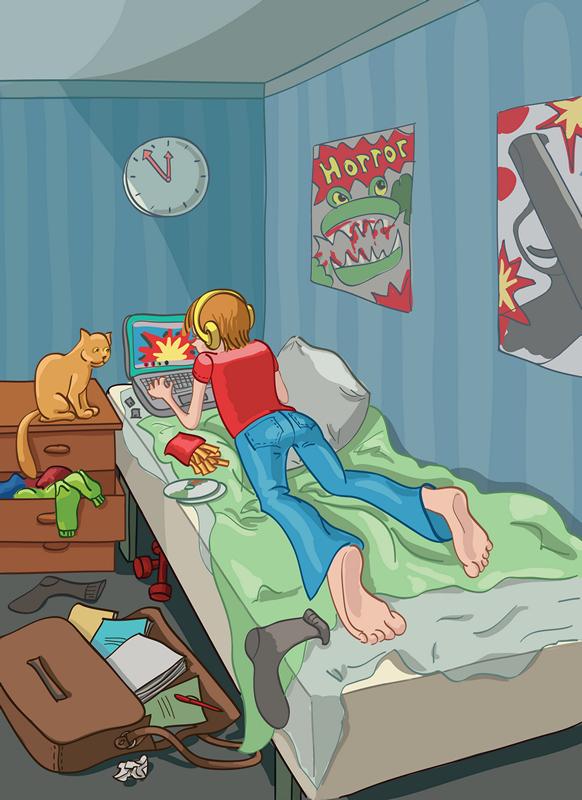1166
What we do get from video games: harm or benefit?

Most people who have faced with computer games have this pastime either a negative or positive opinion. Indifferent, in general, a little bit. And for many years now tense debate between opponents and supporters of computer games, with arguments are the most diverse. Sometimes you wonder what build logical chains. And basically two sides abut on points related to the psyche, society, personal development. Let's try to understand what people think about video games psychologists.
In the US, 99% of boys and 94% of girls play video games regularly. Of these 97% is not spend at least one hour per day. Total revenue gaming industry five years ago, more than $ 25 billion a year and the games themselves have long been an integral part of pop culture.
In the video game frowned upon, perhaps, since their introduction. For decades, they ascribe all kinds of damage has on the body and minds of children and adolescents. With the Wolfenstein 3D , followed by the first and Doom , began to gain strength raging to this day people's love for the three-dimensional shooter. As a result, the list of sins computer games added propaganda of violence and bloodlust. It is also assumed that the excessive enthusiasm for the games can cause psychological dependence, depression and sometimes when a player too much empathizes some not too joyful plot moves. Also on the blame game that some mentally unbalanced young people from time to time arrange shooting in US schools. In this country, there are even programs to divert children from video games. But, despite this, children play there almost without exception, and intoxicated by.
So whether or not games are harmful? And if yes, but how? This is the question researchers are given for several decades, but the results of the various tests and observations are quite contradictory. In the end, psychologists are increasingly began to say that the time would have to pay attention not only on the negative, but also on the positive aspects of playing video games, which are usually ignored, because the researchers initially put a goal to find a negative. But in recent years games have changed a lot, become much more complicated, more realistic, more socially-oriented. It must also have some influence. And some studies conducted in the last five years, saying that the games are not so bad. Psychologists say that the current video games can contribute to the development of social and cognitive skills, give a new emotional experience, and sometimes even contribute to overall improvement of the psyche.
Research in the fields of developmental and evolutionary psychology for a long time underestimated the positive impact of games, especially in childhood and adolescence. Playing social games, children not only will test different scenarios of interaction with others, but also learn to deal with conflicts that may arise in real life. Games allow safe "rehearse" the power and dominance, aggression, pain and tears.
Some time ago, the researchers found that the rats in the playful fights produced факторы growth in areas of the brain responsible for social activity. As a result, the medial prefontalnaya area gets extra stimulation and eventually better developed. And given the great similarity of some social games in animals and humans, it can be assumed that the brain of our children's games can have a similar impact.
But can we assume that video games can also help the younger generation "bleed skills"? According to Isabella Granik, one of the authors of the study benefits of video games , - yes, this kind of social interaction can give players the same benefits as "off-line" games. Any gamer knows that video games not only provide unique possibilities of interaction with the in-game system, not available at the more passive forms of entertainment (cinema and television), but also allow the network to compete with hundreds or thousands of other people.

Under the banner of one of the most popular online games - WoW, - has gathered more than 20 million players explore the world, fight with each other and with the game monsters, collect into clans, mining raw materials, creating objects, communicating in chat rooms, trade with each other. Success Minecraft can not explain the realistic graphics and excellent physics of the world, and after the game, millions of people spend countless man-hours to create virtual worlds and sharing them with others players. And what about the series of games Sims , in which the player character lives through its virtual life, ordinary or extraordinary, only to the extent of your imagination. There are plenty of popular game worlds in which enthusiastically spend time and interact with each other by representatives of almost all countries of the world.
So, what is found Izabela Granik with your colleagues? What can give us a video game, what skills can be developed with their help?
Cognitive abilities
Multiplayer games help children and adolescents learn to resolve problem situations by making different approaches. Interactive games can also stimulate creativity and inventiveness. Although it is not entirely clear with respect to the correlation of skills learned in games to real life situations, but available data are encouraging nevertheless.
Motivation
In addition, immediate feedback allows players to be in the « zone of proximal development » (it's понятие introduced Lev Vygotsky). With the increasing complexity of the game skill level of the players is also improved, as a result of long practice. And with periodic reinforcements games stimulate not give up, despite all the new and more complex challenges.
As in the previous section, there is little evidence that obtained during the gaming motivation can be transferred to real life. While many virtual problem-solving skills can be applied in everyday situations. In addition, the importance played by the player's character, his individual characteristics.
Emotions потока» It promotes the growth of self-confidence in their abilities and that, in theory, could have a positive effect on mental state.
Positive emotions arising from the regular in-depth immersion in the game, can also increase the perception and get a fresh look at your life. Barbara Frederickson, the author of the psychological theory broaden-and-build, believes that positive emotions contribute to expanding the range of desired behaviors and build social relationships that help achieve goals and cope with setbacks. It is not clear whether fit into this theory of emotions that arise in the course of video games, but most gamers appreciate the emotional impact they receive.
Social skills
Despite the aggressive plot of many games, they still teach the players work as a team, focusing on the interaction with each of the participants. According to the study, if the shooter to play in the company of friends, the level of hostility and aggression decreases stronger than if you play the same game alone. Given the criticism from the public concern in this area it makes sense to carry out further studies. But it is possible with a certain degree of certainty say that the joint game improves social skills and reduces the level of aggression.

Other Applications Games h3>
Despite the fact that video games are extremely entertaining status, their popularity is placed at the service of medicine, in order to increase motivation patients. For example, children with cancer has been established game Re-Mission . It is a shooter in which to manage the nanorobots inside the human body and destroy cancer cells. Children playing in this game, learn more about their disease, the side effects of treatment and the importance of treatment adherence. According to studies, the players (and there are more than 200 000) Re-Mission is really enhanced their belief in recovery.
Many other games have participated in academic research as applied to the study of foreign languages, history, geography, mathematics, physics, etc. Some educators believe that video games can be a new tool to assist in the assimilation of educational material. Although the effect of educational games it is poorly studied, so that the issue of quality control of the study material is opened. In addition, always need to find a compromise between entertainment and education components, so there is little hope the widespread educational games.
* * *
As noted above, in many publications reflected a one-sided negative view of video games. But hang on their label - the "bad", "good", "aggressive", "social" - is overlooked many aspects inherent in the modern game. People choose to play with their advantages and disadvantages, depending on their intrinsic motivation.
Undoubtedly, in the future, at the same time as the need to explore the advantages and disadvantages of video games, to better understand their impact on young minds, including in various stages of formation of the person. A modern system of labeling of games according to age categories, adopted in the gaming industry, is not supported by any research.
Source: geektimes.ru/company/asus/blog/267646/
451 on the Internet: in the HTTP, a new status for the authorities blocked websites
Andy Weir, author of "Martian", is writing a book about a woman on the moon























